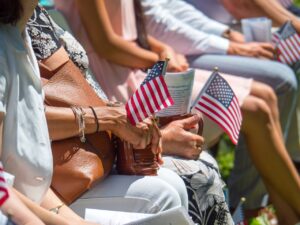 You, my brothers and sisters, were called to be free. But do not use your freedom to indulge the flesh; rather, serve one another humbly in love. For the entire law is fulfilled in keeping this one command: “Love your neighbor as yourself.” (Galatians 5:13–14)
You, my brothers and sisters, were called to be free. But do not use your freedom to indulge the flesh; rather, serve one another humbly in love. For the entire law is fulfilled in keeping this one command: “Love your neighbor as yourself.” (Galatians 5:13–14)
Cookouts. Fireworks. Family. I have many good memories of celebrating Independence Day, a holiday when we celebrate the birth of the United States of America and all the freedoms afforded to us because of where we live. Freedoms that men and women (and their families) fought and sacrificed for, from the battlefields to the halls of Congress, from courtrooms to grassroots movements—all starting on the day in 1776 when the US declared it was no longer a colony of England but rather an independent nation.
What does freedom mean? If you ask people on the street, or those on social media, you’ll get a variety of responses. Freedom means we get to choose things like what kind of job we’ll have, where we’ll work, who we’ll marry, when we’ll have kids, if we’ll have kids. Freedom also means that we aren’t punished by the government with jail time (or worse) when we publicly express an opinion different from the person in office.
But does freedom mean that we can do whatever we want, say whatever we want, no matter the cost to others?
Of course not. As Paul says in 1 Corinthians 6:12, “‘I have the right to do anything,’ you say—but not everything is beneficial. ‘I have the right to do anything’—but I will not be mastered by anything.” Just because we have the freedom to do something doesn’t mean that we should. Every decision has consequences, and it’s possible to express my freedom in a way that hurts someone else.
Our society teaches us that freedom means we put our own desires above those of others. But the Bible teaches that we have a different type of freedom available to us—one that we can only achieve when we become dependent on Jesus and when we think of others before ourselves.
The freedom we receive from Jesus has a specific purpose—to free us from sin and oppression and transform us into his image. We have been commanded by Jesus to love each other more than we love ourselves. Godly freedom puts others first. When we understand this, we will welcome the internal transformation in our lives—and we’ll look for ways to celebrate our freedom in Jesus Christ every day, not just on July 4.
Dear Jesus, thank you for the freedom that we have in you, and thank you that we live in a country where we can still freely express our belief and allegiance to you above all others. Show us how to share our love with those around us. Amen.